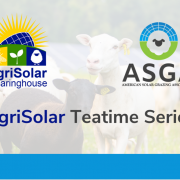ASGA Teatime Replay: Opportunities of Targeted Grazing with John Walker, Texas A&M AgriLife
Dr. John Walker (TAMU AgriLife Research) and Haley Gosnell (who runs joined us to discuss the extensive practical targeted grazing knowledge he and his team have collected from graziers across the U.S. and Canada. John is a range livestock and wildlife specialist who focuses on vegetation and diet selection for grazing ruminants.
From 2021-2022, he and his team conducted a survey of over a 100 targeted grazing serviced providers in the U.S. and Canada, as well as parallel focus groups, on lessons learned from their experiences with targeted grazing. The survey covered a number of different landscapes (from rural to urban and private to public) and variations in vegetation, grazing scales (small to large), and grazing season lengths. This was part of an effort to update the American Sheep Industry’s 2006 Targeted Grazing Handbook.
John discussed the results of the survey and its insights into targeted grazing.
Hosts: Kevin Richardson (ASGA), Caroline Owens (ASGA Board Member), and Carl Berntsen from AgriSolar Clearinghouse / NCAT
This Teatime is part of a series co-hosted and sponsored by the AgriSolar Clearing House team. We thank them for their generous support and for adding their expertise to the Teatime events!
About the Speakers:
Dr. John Walker, Professor, Range Specialist: I am a Professor and Resident Director of Research at the Texas A&M AgriLife Research & Extension Center in San Angelo, Texas. My responsibilities include providing leadership to a multi-disciplinary team of six scientists that develop new technologies for increasing the efficiency and sustainability of range livestock and wildlife production. My research interest relates to developing new technologies for modifying diet selection of grazing ruminants. It has long been known that livestock grazing affects the botanical composition of vegetation communities. By avoiding some plant species and preferring others, livestock provide a competitive advantage to plants that are avoided, which allows them to increase and often dominate a site. Grazing systems were developed to help overcome this adverse effect of selective grazing on rangeland composition. I am interested in directly modifying the grazing habits of livestock through selective breeding, nutritional interventions and learning. In conjunction with this research, I have developed near-infrared spectroscopy calibrations that use fecal spectra to predict the botanical composition of diets.


